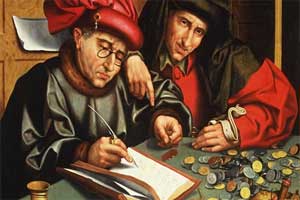 Paying by check has been such a pervasive American custom that you might suppose the idea started here. Not so. The history of the use of checks to pay for goods or services goes back more some 2,000 years.
Paying by check has been such a pervasive American custom that you might suppose the idea started here. Not so. The history of the use of checks to pay for goods or services goes back more some 2,000 years.
The word “check,” in fact, may have evolved from the Persian word “sakk,” according to a history of check use compiled by the Federal Reserve Bank of Atlanta. The report opens with a story of an Iranian traveler, Nasir-i Khosrau, who visited the ancient city of Basra (in present-day Iraq), in the early eleventh century. While in Basra, Khosrau, a merchant, gave written instructions to his bank to make a payment to a creditor out of his account.
Although this recorded story is one of the first substantial evidences of the use of checking, it had already been a well-established practice in the eastern Mediterranean area for hundreds of years. Crusaders who marched on the Middle East hoping to reclaim Christian sites became acquainted with the system and carried the notion back to Europe, which had extremely primitive monetary systems by contrast. The still-evolving nations of the Continent had few coins of reliable value, no banks and few notions of how to conduct long-distance transactions, let alone local trade.
Barcelona, Florence, Genoa and Venice — large commercial centers of the 13th Century — were among the bellwether communities to establish rudimentary banks to facilitate payments among local merchants. But the process was clumsy. It required that the payor and payee both walk to the payor’s bank, where an oral order was presented to the banker requesting that the required amount be paid to the payee. The banker then duly made a record of the transaction in his journal.
The payee was willing to go to the trouble, because the coinage of the era was very unreliable and large amounts of coins were heavy and awkward to deal with. Occasionally the banker would allow the client to overdraw the account, another innovation to facilitate commerce.
Written orders to transfer funds were viewed with distrust because of the possibility of fraud on the part of payor, payee or even the banker. When all three parties were required to be present, each had at least two eye witnesses to the deal.
In the Middle Ages, banks were locally chartered and could handle transactions only in their own towns. Bills of exchange became a common method of doing business, with the bill written in one city but paid in another through a cumbersome process of moving funds from one bank to the other. As the systems became more sophisticated, checks became more common.
Checks began to appear in Europe about 1400, but it took time for banks to accept that form of transaction. There was widespread distrust among banks in general, but over time, convenience trumped the lingering concerns and checking became more entrenched, despite fraud and abuses.
Use of checks was firmly established in England when the American colonies were established and — with many circuitous stops, starts and enactment of laws primarily aimed at oversight — the emergent United States took up, improved on and firmly adopted the custom. In 2006, according to the Federal Reserve System, Americans wrote some 33 billion checks.


